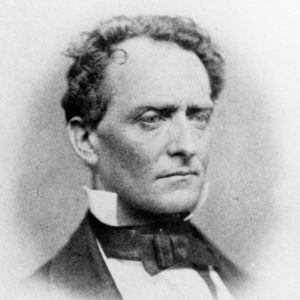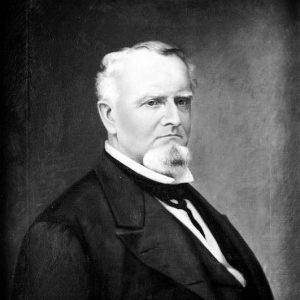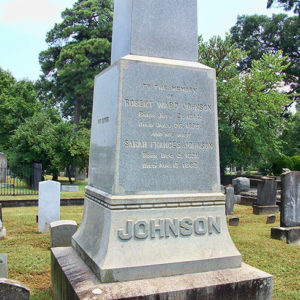calsfoundation@cals.org
Robert Ward Johnson (1814–1879)
Robert Ward Johnson was an Arkansas political leader who represented the state in both chambers of the U.S. Congress and as a congressman and senator in the Confederate Congress.
Born on July 22, 1814, in Scott County, Kentucky, to Benjamin and Matilda Williams Johnson, he belonged to a powerful political family, as two of his uncles represented Kentucky in the U.S. House of Representatives, and another uncle, Richard Mentor Johnson, eventually became vice president of the United States. His father was appointed Superior Judge for Arkansas Territory (predecessor of the Supreme Court of Arkansas) in 1821, and President Andrew Jackson later appointed him in 1836 as the first Federal District Judge for the new state of Arkansas. One of his daughters married Ambrose H. Sevier, head of the state Democratic Party and one of the first U.S. senators from Arkansas.
Robert W. “Bob” Johnson graduated from St. Joseph’s Academy in Bardstown, Kentucky, in 1833 and, two years later, earned a law degree from Yale. On March 10, 1836, he married Sarah S. Smith, daughter of Dr. George W. and Sabina Dubb Smith of Louisville, Kentucky. They had six children, three of whom lived to adulthood. Sarah died in 1862, and Johnson soon married her younger sister Laura on September 23, 1863; they had no children.
Arriving in Little Rock (Pulaski County) in 1835, Johnson became county prosecuting attorney in 1840. Two years later, he became state attorney general and then won election as Arkansas’s sole member of the U.S. House of Representatives in 1846. As a congressman, he served on the Committee on Public Lands, where he championed the rights of cheap land to boost the development of frontier states such as Arkansas. When the Compromise Crisis erupted in 1850, U.S. Representative Johnson took the most extreme Southern positions, refusing to vote for any of the Compromise of 1850 except the new Fugitive Slave Act. His Whig opposition used his disunionist views against him in 1851, so Johnson curbed some of his more extreme positions. All during the 1850s, his Southern disunionism remained basically dormant.
On July 6, 1853, Governor Elias Nelson Conway, a relative by marriage, appointed him to the U.S. Senate, a position made vacant by the resignation of Solon Borland. Winning election to a full term the following year, Johnson served in the U.S. Senate from December 1853 to March 4, 1861. He supported the Kansas-Nebraska Act and fought for the Homestead Act; after 1854, however, he came to believe that the object of such legislation was to undermine slavery. By 1860, Johnson was one of the wealthiest lawyer/politicians in the state. His plantation in Jefferson County (near the county seat of Pine Bluff) was assessed in 1860 at over $800,000 dollars, and he owned 193 slaves. Johnson and Governor Conway basically dominated state politics during the 1850s through their control of the Democratic Party.
In 1860, this political dynasty, known as “The Family,” suffered a major political setback. The dynasty attempted to rotate offices, with Senator Johnson yielding his U.S. Senate seat to Governor Conway and the governor’s office going to Robert W. Johnson’s younger brother, Richard H. Johnson. Such maneuvering incited a revolt by other members of the party. Led by Congressman Thomas C. Hindman, who ran Henry Rector for governor, an insurgent ticket swept the state in 1860. The Family lost the governor’s office and both seats in the U.S. House of Representatives.
The approaching secession crisis, however, sparked new life to Johnson’s political career. Joining now with Congressman Hindman, Johnson helped carry Arkansas out of the Union and into the Confederacy. He was one of five Arkansans elected to the Provisional Confederate Congress in May 1861. When that became a bicameral assembly a year later, the state legislature selected Johnson as one of Arkansas’s two Confederate senators.
Johnson was one of the richest men in the Confederate Congress. He strongly supported the administration of President Jefferson Davis, served on the powerful Military Affairs Committee, and chaired the Committee on Indian Affairs. He never attended the final Confederate Congressional session which met between November 1864 and March 1865. By that time, Senator Johnson realized that the Confederacy was lost.
The South’s defeat bankrupted him and destroyed his political career. After first fleeing to Galveston, Texas, to leave the country, Johnson finally decided to return to Arkansas. He relocated to Little Rock, where he began a law practice with Albert Pike, an old political enemy and a former general in the Confederacy. Johnson attempted to regain his U.S. Senate seat in 1878, but he lost to fellow Democrat James D. Walker. Johnson died on July 26, 1879, in Little Rock. Known for his wealth and courtly manners, Johnson, during his political career, defended slavery and the South as he and his relatives dominated Arkansas politics during the last three decades of the antebellum era. He is buried in Mount Holly Cemetery in Little Rock.
For additional information:
Bolton, S. Charles. Arkansas: Remote and Restless, 1800–1860. Fayetteville: University of Arkansas Press, 1998.
Dougan, Michael B. Confederate Arkansas: The People and Policies of a Frontier State in Wartime Tuscaloosa: University of Alabama Press, 1976.
———. “A Look at the Family in Arkansas Politics, 1858–1865.” Arkansas Historical Quarterly 29 (Summer 1970): 99–111.
Lewis, Elsie M. “Robert Ward Johnson: Militant Spokesman of the Old South-West.” Arkansas Historical Quarterly 13 (Spring 1954): 16–30.
Woods, James M. “Devotees and Dissenters: Arkansans in the Confederate Congress, 1861–1865.” Arkansas Historical Quarterly 38 (Autumn 1978): 227–247.
———. Rebellion and Realignment: Arkansas’s Road to Secession. Fayetteville: University of Arkansas Press, 1987.
James M. Woods
Georgia Southern University
 Louisiana Purchase through Early Statehood, 1803 through 1860
Louisiana Purchase through Early Statehood, 1803 through 1860 Politics and Government
Politics and Government Robert Ward Johnson
Robert Ward Johnson  Bob Johnson
Bob Johnson  Robert Ward Johnson Gravesite
Robert Ward Johnson Gravesite 




Comments
No comments on this entry yet.